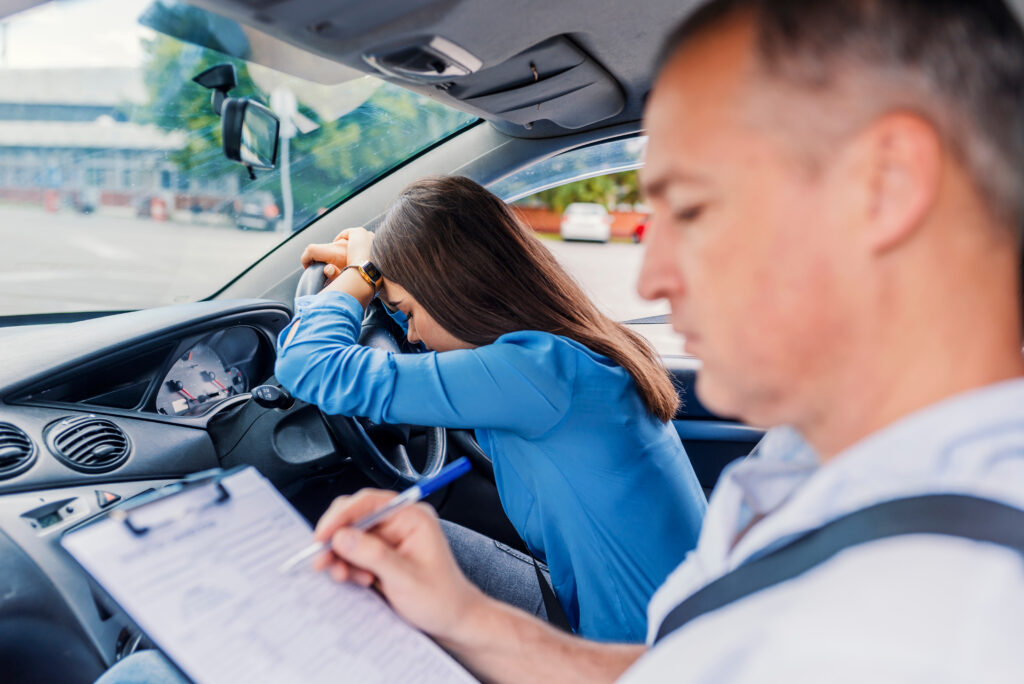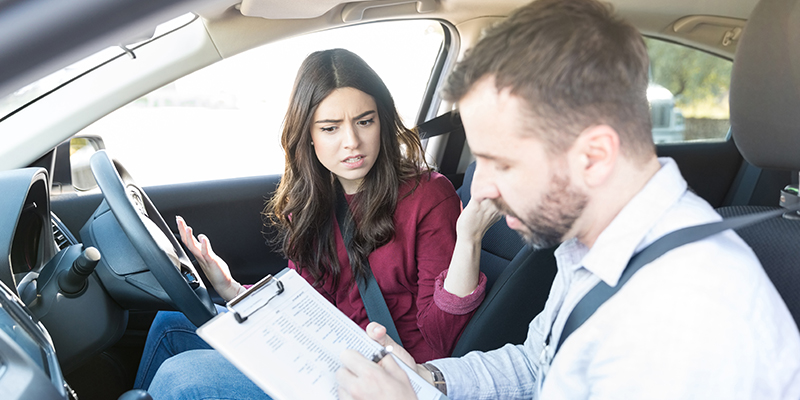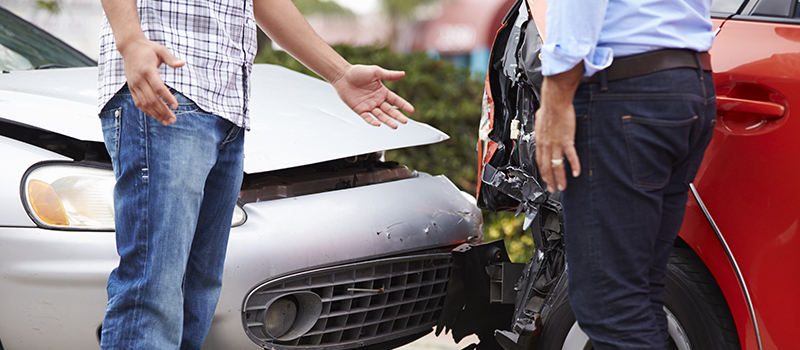As you approach your driving test you may be asking yourself lots of questions such as: “Am I good enough?”, “What am I going to do if I fail?”, “Can the driving examiner stop and terminate the driving test?”
It’s quite normal to have all of these thoughts going through your head in the lead-up to your driving test. However, not many learners are aware of how and when a driving test may be aborted/stopped early.
Reasons an examiner might stop your driving test
We have created an extensive list of all the ways a driving test could be stopped and how to avoid these. To find out what could cause your examiner to stop your test and how to avoid this, check out the links below:
- Problems with your provisional driving licence
- Forgetting your provisional driving licence
- If your car is not roadworthy
- If you fail the eyesight test
- If your driving is too unsafe
- You threaten the examiner
- You try to bribe the examiner
- If you decide to stop
- Mechanical fault with your car when the car is on test
- If you have an accident on your test
- Motorway driving
- Do examiners like aborting driving tests?
- What should you do if you think you have committed a serious or dangerous fault?
- What happens if the driving examiner aborts your driving test?
- What is a walk-back on a driving test?
Problems with your provisional driving licence
If the examiner is not happy with your provisional driving licence your test will not start.
They could be unhappy with your licence for several reasons, such as:
- Your licence has expired
- They believe you are not the licence holder
- Having too many penalty points (six or more)
Or, and this is a common problem, you forget your provisional driving licence altogether!
Forgetting your provisional driving licence
Although this isn’t classed as an aborted test, it’s worth mentioning your test will be cancelled if you don’t have your provisional driving licence with you.
It’s essential to remember to bring your provisional driving licence with you on your test day. Make sure you have your driving licence in your hand several weeks leading up to your driving test as well as on the day. If you have lost your provisional licence, the test cannot proceed, even if you have a picture of it on your phone. You must bring the original document with you on your driving test.
Over the years, we have seen many learners have their test shut down before it even gets started because they have forgotten to bring their provisional driving licence with them. This is an easy mistake to avoid, and any learner who forgets their licence will not receive their test fee back, so it is doubly heartbreaking. Please remember your provisional licence!
If your car is not roadworthy
Again, if your examiner does not think your vehicle is safe, they will not risk taking you out in it. The car you are taking your test in must be insured correctly, roadworthy and have a valid MOT. Learning to drive with a driveJohnson’s instructor this won’t be a problem: all of our teaching vehicles are correctly insured, checked and up to standard.
If you are taking another car on your test then you will need to ensure it meets the minimum requirements to pass an MOT. If your car had an MOT six months ago, things such as the tyres would have worn more, so be sure to check the following:
- Tyre depth is 1.6mm minimum across 3/4 of the tyre with no cuts and bulges.
- All lights are working including direction indicators.
- Windscreen wipers and washers are in good working order.
Any red warnings or amber warning lights must not be present on the dashboard. These include warnings for tyre pressure, engine management, and airbags (service light is accepted).
If you fail the eyesight test
It may sound silly but every year some learners (not many) fail the eyesight check. Your driving examiner won’t get in the car with someone they do not think can see well enough behind the wheel.
This can often happen to someone who has been learning on and off for many years. All driveJohnson’s instructors are trained to check your eyesight on your first lesson and several weeks leading up to your test.
If you are concerned in any way about this point, we would always suggest getting your eyes tested at your local optician to be sure. They will be able to give you peace of mind as well as glasses, should you need them.
Lastly, if your eyesight is borderline or you don’t like wearing your glasses, DO NOT FORGET THEM ON YOUR TEST DAY! You should have been wearing them for all of your driving lessons anyway!
If your driving is too unsafe
There are occasions when the examiner has to abort the driving test in the interest of safety for you, yourself and the public. This will usually happen in the first half of the driving test if your driving is deemed dangerous to the point that the examiner has to verbally or physically intervene to avoid an accident.
If your examiner intervenes just once, then yes, you have failed your test; however, you should try to carry on as best you can to avoid the test being aborted. The examiner won’t usually abort the test for just one serious or dangerous fault. However, it’s not uncommon for them to abort the test if you do 2-3 serious faults in the first 10-15 minutes.
Here are some examples of situations where an examiner would most likely intervene:
- If you misjudge traffic at a junction when it’s not your priority.
- If you misjudge changing lanes with a vehicle already in that lane or going into the same lane as you want.
- If you are too close to parked cars when passing them.
- If you haven’t seen a pedestrian/cyclist or you are too close to them.
- If you are driving above the speed limit, for example, at 35mph in a 30mph zone or higher.
- If you are trying to move off and haven’t seen a vehicle in your blind spot or coming towards you at speed when it’s their priority.
- If you have spatial awareness issues, such as drifting towards the kerb too many times.
- If they suspect that you are under the influence of drink or drugs.
These are just a few examples but some of the most common ones.
You threaten the examiner
In recent years, the DVSA has been cracking down on abusive behaviour against driving examiners. This includes:
- Verbal abuse
- Physical threats
- Assaults
- Damage to property
- Driving off with the examiner in the car without their consent
- Trying to run them off the road
- Death threats
If your driving examiner feels threatened at any point during your test they will immediately end the test and you will fail. You will be reported to the police and the DVSA will push for the strongest possible penalties as part of their campaign to stop examiner abuse.
One of our driving instructors in Leeds, Lee Paul Serwatka, said, “I always say to my learners that there’s no point in getting angry and yelling at the examiner. It won’t help you to pass, and you’ll likely be banned from having your test there again in the future or worse, so be polite even if you are unhappy with their decision.”
You try to bribe the examiner
If a driving examiner were found to have taken a bribe for any reason they could face criminal prosecution, fines and even jail time, as well as the loss of their job, so the chances a bribe would be accepted are negligible.
If you were to try to bribe an examiner, the examiner would immediately stop the test and fail you. It would be marked on your record, which could lead to delays and extra scrutiny in taking your test in the future. It could also result in you facing criminal charges. Facing bribery charges could affect your employment, travel opportunities and reputation. For all of the above reasons, trying to bribe the examiner would be a very bad idea.
If you decide to stop
If you decide that you do not want to carry on driving, the examiner will not force you to continue. Should you decide you feel too ill or too anxious to drive, have made a big mistake and don’t want to carry on – whatever the reason, you have the right at any time to request to end the test early.
Having waited a long time for tests, we find that learners don’t often ask to have their tests stopped early, but know that your driving examiner will always listen to you and terminate the test if you would like to stop.
Mechanical fault with your car when the car is on test
Unfortunately, you can start your driving test and halfway through a warning light can come on.
The warning light that comes up will determine the examiner’s actions. If it’s a low fuel light, the examiner will assess the remaining distance left on the test versus how much fuel is available and usually finish the test if it’s very achievable. If it’s an airbag light, traction control light or engine management light, to name a few, then the examiner should abort your driving test.
If you have an accident on your test
This is every learner’s nightmare and, for the unfortunate few, an accident may mean an immediate end to their test.
You are legally required to stop to exchange contact information and insurance details after an accident. If the car is damaged and not safe to drive, if exchanging information takes too long or if you are too shaken to continue (especially if the examiner thinks you may be suffering from shock) the examiner will end your driving test early.
If the accident was your fault, the test will be marked as a fail. If it wasn’t, then you will be stopped and marked as “no result”. You will then need to book another test.
Motorway driving
You may well be asking, “Can I drive on a motorway on my test?” and the answer is a definitive no. So if you take a wrong turn and find yourself driving on a motorway, your examiner will try to get you off it as soon as possible either by asking you to park on the hard shoulder or guiding you off at the nearest exit. They will then end the test early.
If the examiner considers that it was your error for going on to the motorway, they will stop your test and mark it as a fail. If it was not your fault, but you were forced to go on to the motorway by the actions of other drivers, then your test will be terminated with a “no result” mark.
Driving examiners are trained to prevent learner drivers from going on to motorways during their driving tests so the likelihood of you ending up on a motorway is low.
Do examiners like aborting driving tests?
No, they don’t. It usually means they will miss their next driving test. If it’s safe to do so, they will try and direct you closer to the test centre, so they don’t have to walk so far. This is why we said earlier that if a test is going to be aborted it is likely to happen in the first 10-15 minutes. If you can’t drive safely on quiet 30mph roads, then it makes no sense for them to take you on a fast dual carriageway. However, some learners can start well and then lose their nerve when they realise they have made some serious mistakes.
What should you do if you think you have committed a serious or dangerous fault?
It’s really important to put that fault behind you and focus on the road ahead. Try your best not to have faults. Some learners may go into “I don’t care mode” and start to lower their standards. If you do this, it will increase your chances of the test being aborted.
Why not try your best, so that, at the end, you can find out the test result knowing you gave it your all? If you get 1 serious fault and 6 driving faults, you know you aren’t that far away from passing next time.
What happens if the driving examiner aborts your driving test?
The examiner will ask you to pull up on the left (usually) in a safe location where you can park your car legally. They will then ask you to remove the keys from the ignition or give them the keys.
Once they have the keys, they will let you know they are aborting the driving test in the interests of safety. They will then advise you to remain in the car and return to the test centre. Once they arrive, the examiner will advise the instructor or guardian who took you to the test of the result and then they will come to find you. If your driving instructor has been with you on your test they can drive you and the examiner back.
What is a walk-back on a driving test?
As your driving examiner will not be insured to drive the car, they will likely need to walk to get back to the test centre. However, if it’s far away, then they will call the test centre to see if they can be picked up.
If your test is stopped early, you can either wait for the examiner to walk back and send someone to get you and the car, or you can walk back to the test centre with the examiner.
Summary
If you have properly prepared for your driving test and are driving at test standard, it is unlikely your driving examiner will end your test early. Ensure that you have your provisional driving licence with you, a vehicle that meets test standards, and the right mindset, and you should be fine.
At driveJohnson’s, our driving instructors will ensure that their vehicles are test-ready and that you are fully prepared before you take your driving test. Our office team is also available to help if you have any concerns. Enquire today and find out how we can support you ahead of your test.











